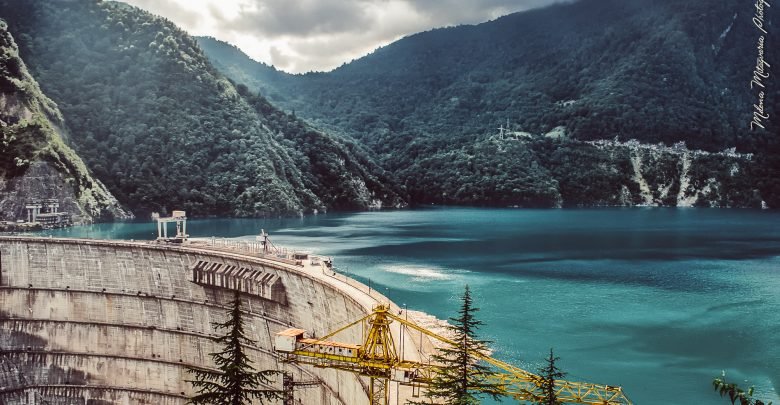
After Enguri HPP Emergency Shutdown, Critics Blame De-Facto Authorities
Media in occupied Abkhazia reported on December 11 that the Enguri hydroelectric plant, a critical source of energy for the region, had been forced into an emergency shutdown due to critically low water levels in its reservoir and insufficient inflows.
To stabilize the power supply, the de-facto authorities are preparing a revised power distribution schedule, which will be announced soon. For the time being, the overnight energy conservation protocol remains in effect, urging residents to conserve electricity between 9 p.m. and 7 a.m.
The shutdown has sparked criticism of the occupied region’s leadership, with former de facto officials and analysts pointing to years of economic mismanagement. Akhra Aristava, a former head of the Economic Department under the de-facto presidential administration, blamed the crisis on the absence of reforms and growing economic inefficiencies under the so-called vice president Badra Gunba’s Economic Reform Commission and de-facto authorities’ economic policy of the last 5 years.
“The main reason for the severe crisis with the country’s energy supply and the payment of salaries to [de facto] state employees is the complete absence of reforms in the economy and other spheres in recent years,” Aristava said. He argued that decisions such as the legalization of cryptocurrency mining in 2020, which led to a surge in energy consumption, were short-sighted and exacerbated existing problems. By 2021, the region faced a funding gap of up to 1 billion rubles for energy needs alone.
Aristava notes the so called agreement in 2022 to transition public sector wage increases to self-financing by 2025, which required 2 billion rubles, and recalls that in 2023 the de facto government of Abkhazia paid for the transfer of electricity from Russia to the tune of nearly 1 billion rubles. “As a result, if the Russian leadership is now demanding payment for electricity, it was predictable and normal,” he noted.
“It was obvious that from 2021, in order to avoid the current crisis, it was necessary to carry out reforms and increase the economy and budget of the country in the necessary amount. And there seemed to be understanding, a commission on economic reforms headed by [de facto] vice president Badra Gunba was established, but unfortunately, the commission did not offer a single proposal, much less a reform, for several years of its existence,” Aristava stated.
He also noted that as a result, Russia is demanding payment for electricity, and that despite the Abkhaz’ expectations that Russia would come to their aid before the New Year’s holidays, criticism should be directed at the de-facto local government, not the Russian one.
Some in the occupied region point to the disproportionate energy consumption of cryptocurrency mining in Abkhazia, estimating that it accounts for 50-60% of the region’s energy consumption, warning that unchecked mining activities and the lack of robust economic development would leave Abkhazia increasingly dependent on foreign aid and vulnerable to financial collapse.
Also Read:
- 04/09/2024 – Kremlin Suspends Funding of Occupied Abkhazia
- 27/12/2023 – Tbilisi, Sokhumi Discuss Enguri HPP
This post is also available in: ქართული Русский